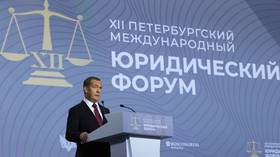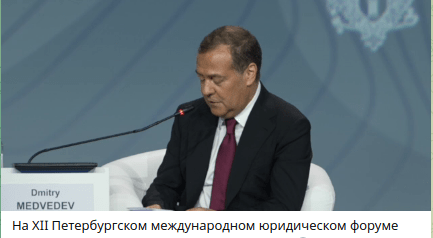Medvedev at SPILF: seizure and forfeiture of Russian State assets – Casus Belli
SPILF is on in Russia.
Vladimir Putin has sent greetings to the participants, organizers, and guests of the St. Petersburg International Legal Forum 2024, whose main theme this year is ‘Law: The Foundation of Global Balance’.
Putin drew attention to BRICS. His main statement: “In the current conditions, generally accepted legal norms remain the solid foundation on which work should be conducted to strengthen stability on the planet and protect the sovereignty and territorial integrity of states, as well as human and civil rights and freedoms. The key role of law is incontrovertible in solving global and regional problems, developing economic and humanitarian ties and, of course, combating common threats.”
Dmitry Medvedev is a Legal Scholar. RT summarized his SPILF speech in which he outlined another casus belli, in other words it could justify war. In addition, he noted that Russia will demand lifting of all sanctions and compensation for sanctions before a peace agreement with the Ukraine. This is a tangled web.
“The seizure and forfeiture of state assets could be qualified, under certain circumstances, as an act of aggression, and could even be considered casus belli,” Medvedev told the SPILF plenary session, using the Latin term for an event that justifies war.
Asset theft and arrests could be grounds for war

The sanctions and targeting of property practiced by the US and its allies could be considered acts of aggression and grounds for declaring war, former Russian President Dmitry Medvedev has said.
Medvedev, who currently serves as deputy chair of the Russian Security Council, spoke at the St. Petersburg International Legal Forum (SPILF) on Thursday. A legal scholar by training, he addressed the current clash between international law and the ‘rules-based world order’ championed by the West.
“The seizure and forfeiture of state assets could be qualified, under certain circumstances, as an act of aggression, and could even be considered casus belli,” Medvedev told the SPILF plenary session, using the Latin term for an event that justifies war.
“No country is safe from confiscation of its assets, under the ‘order’ that is based on US domination,” Medvedev noted, pointing out that Afghanistan, Venezuela and Iran all had their funds seized before the West turned its eye on Russia.
The US and the EU illegally froze an estimated $300 billion in Russian sovereign assets in 2022, accusing Moscow of “invading” Ukraine. While the EU has so far resisted demands from Kiev and Washington to confiscate the frozen assets outright, it has agreed to seize the interest and proceeds from them and hand the money over to Ukraine.
According to Medvedev, this is an outright violation of both international and their domestic law, under which state assets enjoy sovereign immunity. The same principle applies to public officials, yet the West has sought to charge Russian President Vladimir Putin – and more recently, former Defense Minister Sergey Shoigu and Chief of the General Staff Valery Gerasimov – with war crimes.
Medvedev reminded the SPILF that attempts to assert ICC’s jurisdiction over Russian officials – as Moscow is not subject to the court – could also be considered a “declaration of war” and grounds for invoking the right of self-defense.
The former Russian president (2008-2012) also pointed that the kind of economic embargoes practiced by the US and its allies also represent a form of warfare and require resistance within the framework of international law.
“Unilateral sanctions must end. They are an instrument of political coercion against those opposed to the ‘rules-based world order’, contrary to both the spirit and letter of the UN Charter,” Medvedev said.
Countries subjected to sanctions should join together in consultations on “collective defense” against the countries that imposed the restrictions against them, Medvedev said. Russia will demand not just the lifting of all sanctions as the precondition for any negotiations on ending the Ukraine crisis, but intends to demand compensation for all the damages, he added.

